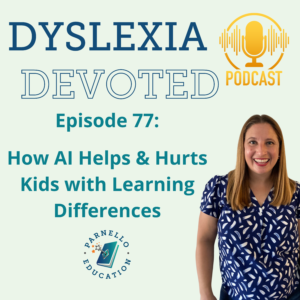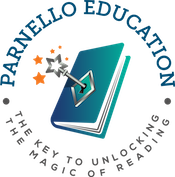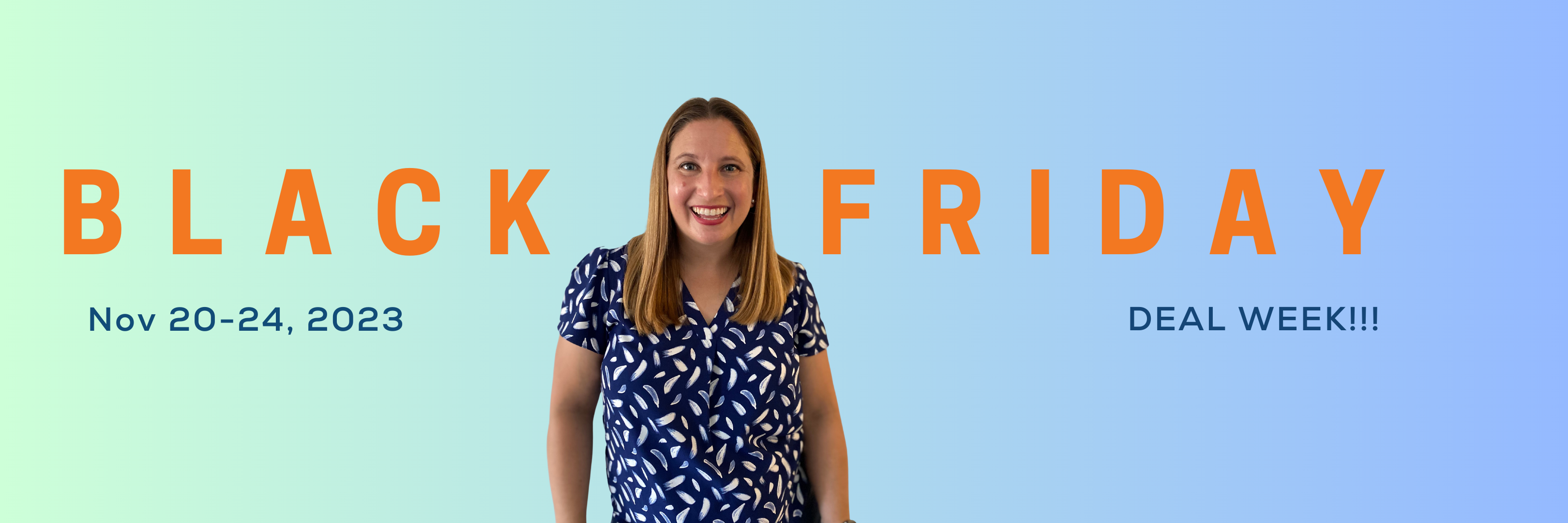
In This Episode:
Black Friday Deals Week has started! Check out the daily deals!
Welcome to Episode 77 of Dyslexia Devoted and today we’re talking about how AI both helps and hurts kids with dyslexia and other learning differences
Shownotes: parnelloeducation.com/episode77
This Episode's Topics:
- What is AI?
- How can it help kids?
- Why is AI making school more difficult for kids with dyslexia and learning differences?
Resources Mentioned in this Episode:
- Get the Dyslexia Devoted Newsletter
- Black Friday Deals Week - 5 days of deals, each one lasts just 24 hours!
Connect with Lisa Parnello:
0:03
Hello and welcome to dyslexia devoted the podcast dedicated to building awareness, understanding and strategies to help those with dyslexia. I'm your host, Lisa Parnello, dyslexia therapist and founder of Parnello education services. Join me as we dive into today's episode of dyslexia devoted.
0:23
Hello, and happy Thanksgiving if you're listening to this in real time, and if you're not happy Thanksgiving anyway, I am taking this full week off, I'm not seeing any clients and instead I'm just going to sleep and enjoy time with family and sit by a cozy fire with my mom and the dog. And I hope you are spending wonderful time with family this week to the last couple of weeks I've seen some of my students both benefit and struggle from technology. And that is what has inspired this week's episode. Welcome to episode number 77 of dyslexia devoted how AI both helps and hurts kids with learning differences. Before we jump into this week's episode, please know it is deals week at Parnello education, I've got five days of deals, where each day I'm putting a different one of my courses on sale, including my brand new morphology in the content areas for teachers and homeschool parents. So each day there will be a different course on sale for just 24 hours. And then the next day it changes to a different deal. And so I'm going to be changing it at 10pm pacific time every day. That way I can sleep in and not have to wake up early to set an alarm to switch the deals. And I'm really excited to be able to share some of these things with you, including the parent course the educator course, the spelling booster workshop, and also on Friday is also 10 slots for my coaching sessions for the 30 minute coaching sessions are on sale too, all you have to do is go to Parnello education.com, forward slash Friday, and you can see what the deal is each day and then log in on the day that has the course or deal that you want to grab. If you already get the dyslexia devoted newsletter, then the links are automatically going to be sent to you everyday anyway, so don't worry about it, and it will come straight into your inbox. All right, jumping into this week's episode is all about artificial intelligence and how the new changes in technology in recent years are suddenly changing the game for kids with learning differences, both the good and for the bad. So let's talk about what I mean by AI or artificial intelligence. When a student has dyslexia, they often rely on technology to provide them with accommodations. Now, this can be super helpful things like predictive text, and AutoCorrect and spell checker, all sorts of things that the computer can figure out and fix for you without you doing hardly any effort. And in addition to that, the new invention of chat GPT, which I realized is not super new, because I do live in the Bay Area where Tech has been around for a very long time. So some of these things have been in the works for a long time. But now that they're getting a lot more widespread, it is now spreading into the school systems. And this can be both helpful and hurtful to kids with learning differences. First, let's talk about the helpful part. kids with dyslexia and other learning differences are growing up in this amazing time, where they actually have all the tools they need, literally in their pocket or their backpack. Because we have a spell checker and think about a long time ago, if you couldn't spell something, they would tell you to look it up in the dictionary, which I always thought was the dumbest thing ever. Because if you didn't know how to spell it, how are you supposed to find it in the dictionary. And I always hated that suggestion. And then people joke around and be like, well, you have to learn how to do this, because it's not like you're gonna carry a dictionary ran in your pocket. Well, actually, we kind of do now, our phones are now able to do so many wonderful things for us, including being a calculator in a dictionary and an encyclopedia all in one place. So to be a person with a learning difference right now, it's actually pretty amazing. Because technology can really help level the playing field, where people don't necessarily know that you're a terrible speller. Because auto fill and spellcheck and all the things that we can do and how can compensate for that. I have one middle school girl that I work with, who just doesn't care about technology, she just never cared to learn it when she was younger. So now that we are getting her ready for high school, we are trying to show her by we I mean, her parents and I are trying to show her how technology can really help her show how much she knows. Because she looks like she doesn't know and understand things if you just look at her writing. But if you were able to talk to her about it, you could tell she knows a lot more than what she puts on a piece of paper or on the screen, so to speak, if you're typing something, and so I've been trying to help her see how technology can really help her. And the other day she saw on my computer I had autofill already in there. So it uses predictive text to figure out what is the rest of your sentence probably going to be and so she was sitting there trying to type and then realize, oh my goodness, how does it know what I want to say next? That's already what I was gonna say. And I was showing her the way technology works is it figures out what logically would make sense in that sentence? What would you probably be, you know, going for and She was blown away about how much faster it made her get her thoughts on paper, she was able to say what she wanted to say a lot quicker with a lot less spelling errors, because she could type what she wanted to say. And then the computer could fix her spelling and figure out what the rest of the sentence would be to make sense. And it was a total game changer because she could see the way her writing could come out so much more smoothly without having so many mistakes without having to go back and change things so much. And it was really helpful for her to see the way technology has come so far in being so helpful for somebody who has her own thoughts and original ideas. But basic sentence structure pretty much stays the same. And so she was able to utilize technology to her advantage. And kids these days love that they can use spellcheck in and configure it for them. As long as they're close enough to the correct spelling. I've taught all of my students that it's critical because if you have three different mistakes in the same word, your spell checker is not going to help you. So they still have to know all their spelling options, they still have to know you know their vocabulary, and they have to know how to write sentences that make sense, or technology is not gonna help them that far, you have to be able to be a basic structure to build off of now the other thing that I've seen is how technology is now starting to hurt kids with learning differences. In the last few weeks, I've seen a lot of schools changing their rules for what kids are allowed to do on computers, because of chat GPT. So many kids have started cheating and using the algorithms and chat GPT to write their essays for them, that I've seen many teachers change the rules for what they have to do. And this obviously comes from an area of necessity, because they have to make sure they're grading kids on their actual skills and abilities. And I understand where it's coming from. But it's also really hurting the kids who needed assistive technology in the first place. So let me explain what I mean and what problems I'm now starting to see arise for the kids that I work with. And I say kids, but a lot of them are actually in that middle to high school age, I'm not actually referring to like the eight 910 year olds. So when I'm seeing these upper middle school and high school kids starting to write their essays, I start seeing them do weird things that that's not how they usually did it. And so the other day, I saw one of the girls writing something by hand in a teeny tiny little square. I was like, why are you writing it on there? Why aren't you typing up your essay? Oh, we're not allowed to?
7:24
Wait, what? You're not allowed to type up your essay. But all essays have to be type. What are you talking about? Well, so many kids were cheating using chat GPT that our teacher makes us handwrite all of our essays now, which I get. But at the same time, do you know what happens if your kid with dyslexia who has to handwrite everything, and it's no longer fixing your spelling errors, or you're a kid with dysgraphia, who has a really hard time writing with a pencil and does so much better if they type, it completely changes the level of difficulty for some of these kids who really rely on assistive technology. And sometimes for the kids, they have a bit of pride where they do have the ability to ask for the assistive technology. But they're being very prideful, and they want to do it the way all the other kids are doing it. And that's causing a little bit of extra struggles. Especially when I see the kids this time of year, so many of them have had colds, because you know, hello, Winter's coming around the corner. And when they don't feel very good, they make a lot more mistakes, because their brain is so busy, you know, fighting germs, that they can't really stay focused on what they're trying to accomplish on paper. And so there's a lot more errors and typos and mistakes that I'm seeing. And it's just so heartbreaking when I know that there's a strategy that works for them. And yet, they're not allowed to use it or they're discouraged from using it. The other thing that I've seen is that one of the girls has to write everything on Google Docs where the teacher can see the like revision history. And so she's not allowed to copy paste ever, because they don't know where it got copied from social. If she takes a quote from somewhere, because she's writing an essay and therefore has to cite evidence from the text. She's actually not allowed to copy the quotation and then paste it. Instead she has to copy it letter for letter and put in the quote and switch back and forth between screens to make sure she copies it correctly. And then that actually not only makes it take a lot longer, it also encourages a lot more errors. Because being able to copy things when you have dyslexia is not as easy as one might think it would be. This always adds a lot more time and a lot more stress to her assignments that she used to know a really good strategy, where if it was any of her own idea, she always typed in by hand, but if it's a direct quote, and she's really using the exact words putting quotation marks, citing them correctly, to show where the evidence came from, that was a good strategy that always really worked for her. And now she can't use it anymore. And now her assignments are taking her a lot longer to get done and it's causing a lot of extra stress. So now that I have seen the way our students can be helped with assistive technology and being able to use AI for the good But I've also seen how people have started to abuse the system. And now it's causing undue consequences for students with learning differences who were not using it to cheat, but just using it to survive school. And it's something I think we all need to stay on top of is helping the kids learn how to when they need to advocate for themselves, how to teach them to say, I have dyslexia, I have the right to this accommodation. And therefore, these are some things that I need to be able to do a slightly differently, I am not cheating, I am not using chat GPT to write all my assignments. For me, I just need to be able to copy a direct quote, in order to make sure that I quote correctly, because otherwise, a direct quote that's quoted incorrectly isn't actually direct quote anymore. And we want the students to be able to utilize tools that they would really use in the real world. And we want them to not be punished for having a learning difference, because some other people have chosen to cheat. It makes me think a lot about those college admission cheating scandals that we've seen about maybe four years ago can't remember when exactly. And so many people were cheating to try to get into college admissions and utilizing accommodations they didn't really need. It actually hurt a lot of people who really do need the accommodations because they had to fight a lot harder to get the accommodations they deserve used on any sort of standardized assessment that gets you into college. So us as adults really need to use our power to advocate for children who need to be able to use technology for their positive resources, and not let them be unfairly punished for a few people making poor decisions on how to use assistive technology and chat GPT and other forms of artificial intelligence, kind of computer systems. And we want to make sure that the kids still get to use the accommodations that they are entitled to, and that they can learn how technology can help them in order to do better in school because they have the right ideas in their heads. But being able to get it out on paper is sometimes really difficult. So we need to figure out how we can find the balance between people who are using technology for cheating, and people who really need technology to help them level the playing field. Alright, that is it. For today's episode. I hope I gave you a little something to think about. And I really hope that you have a wonderful time with your family and friends or whoever you spend the holidays with. We are keeping it pretty simple in the Parnello house. And so I'm going to go get cozy by this fire and snuggle up with a pup. And I hope you are able to find somewhere cozy to spend your Thanksgiving week. Don't forget if you want to join in on the daily deals. I've got five days of deals, starting Monday and ending on Friday of Thanksgiving week. 2023. So make sure you just go to Parnello education.com Ford slash Friday, see all the daily deals. Or if you are on the dyslexia decoder newsletter, you're going to get them sent to your inbox every day anyway. And so I'm going to be changing the deal at 10pm Pacific everyday this week, because I am not getting up early to change the deal for you guys. And instead I'm just going to do it right before I go to bed every night. All right. That is it. Thank you so much for joining me. Happy Thanksgiving all the best to you and your family. Cheers. See you next time.
13:16
Thanks for tuning in to today's episode. If you want to learn even more about dyslexia, check out Parnello education.com forward slash courses. See you next time.

